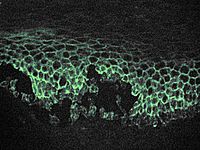
Photo from wikipedia
Abstract The aim of this study was to evaluate the clinical importance of autoantibodies in pemphigus vulgaris patients who developed steroid-induced diabetes mellitus (SID) because of the glucocorticoid therapy of… Click to show full abstract
Abstract The aim of this study was to evaluate the clinical importance of autoantibodies in pemphigus vulgaris patients who developed steroid-induced diabetes mellitus (SID) because of the glucocorticoid therapy of pemphigus. A total of 137 patients with pemphigus vulgaris were studied. Patients with SID and pemphigus were compared with those that had only pemphigus. The variables recorded were: age at diagnosis, sex, body mass index, presence of diabetes mellitus (DM), cumulative cortisone dose, treatment duration, value of anti-desmoglein 1 and 3, and anti-glutamic acid decarboxylase autoantibodies. A total of 31 patients (22.62%) that developed steroid-induced DM were identified. Anti-glutamic acid decarboxylase autoantibodies were positive in 20.75% of patients with pemphigus vulgaris and in 25.75% of patients with pemphigus vulgaris and SID. The overall anti-glutamic acid decarboxylase autoantibodies prevalence in pemphigus patients was high, and the risk of developing DM in patients with pemphigus remains a serious problem, being associated with increased risk of mortality.
Journal Title: Medicine
Year Published: 2018
Link to full text (if available)
Share on Social Media: Sign Up to like & get
recommendations!